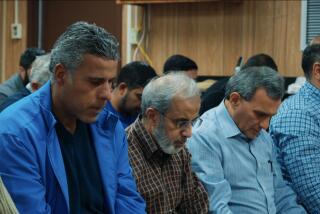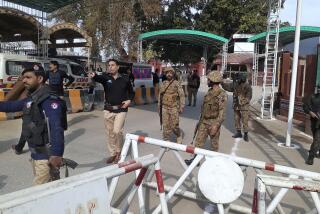Britain Gets Tougher in Terror War
- Share via
LONDON — LONDON -- An early morning anti-terrorism raid on a notorious Finsbury Park mosque here Monday showed how the rules of the game have changed in Britain’s struggle with Islamic extremism.
Illuminated by two police helicopters, about 150 officers in riot gear stormed the mosque at 2 a.m. using battering rams and ladders. They arrested seven suspects in the investigation of a terrorist network involved in the production of a deadly poison and the slaying of a police detective. A search of the mosque turned up canisters of CS tear gas, a stun gun and an imitation firearm along with potentially significant documents, police said.
The raid also sent an emphatic message: Police have decided to get tough with a house of worship that, according to European law enforcement, has openly recruited Islamic extremists and supported terrorist acts. The three-story red-brick structure, which stands next to elevated railroad tracks, has been a crossroads connecting European ideologues to Afghan training camps and Islamic battlegrounds in Chechnya, Bosnia- Herzegovina and the Middle East, according to investigators.
The North London Central Mosque played a role in the radicalization of scores of “holy warriors,” including Richard Reid, the Al Qaeda “shoe bomber” convicted of trying to blow up an American Airlines flight, and Zacarias Moussaoui, the Frenchman on trial in the Sept. 11 terrorist conspiracy, police say. Its Egyptian-born imam, a one-eyed cleric with hooks for hands named Sheik Abu Hamza al Masri, has been a very public face of hard-core Islam. His glorification of Osama bin Laden and his active contact with accused terrorists around the world have made him the target of investigators in the U.S. and other countries.
Even after the Sept. 11 attacks, though, British authorities were slow to move against Abu Hamza and Abu Qatada, a fellow radical cleric revered in Al Qaeda who was jailed late last year. Liberal laws governing free speech and political asylum protected Abu Hamza and his associates, who in the past treated Britain as a haven rather than a target, according to European experts.
The classic trade-off between intelligence work and crime prevention also played a role. Britain’s powerful spy agencies found the Finsbury Park mosque a valuable surveillance post for watching Al Qaeda’s web of contacts despite complaints of investigators in mainland Europe that London was a headquarters for directing attacks elsewhere, experts say.
A Fatal Manhunt
Tolerance for Islamic fundamentalism has faded fast in Europe, especially as intelligence agencies learned in recent months that an Al Qaeda-linked Algerian network in Britain and France was plotting an attack, possibly with lethal chemicals. And last week, a suspected member of that network stabbed a Manchester detective to death during a manhunt resulting from the discovery of a makeshift lab for producing the deadly toxin ricin. The slaying, and the fact that a suspect in the ricin case worked at the mosque’s bookstore, appears to have pushed police across a long-standing line.
“The raid was symbolic and necessary to show the government was getting tough,” said Mustafa Alani, an analyst at the Royal United Services Institute, a London think tank. “There was certainly a benefit in the past for intelligence-gathering. It is always a balance between the intelligence benefits, security and public opinion.”
Nonetheless, police Monday did not arrest Abu Hamza, who lost an eye and his hands in Afghan combat in the early 1990s and is wanted by Yemen in connection with the slayings of Western tourists four years ago, a crime in which the cleric’s son was arrested. Abu Hamza’s bank accounts have been frozen, but as a British citizen he cannot be arrested under new anti-terrorism legislation that gives police considerable power to detain foreigners.
“He was not part of this operation,” said Deputy Police Commissioner Andy Trotter. “We were not looking for him today and not in relation to this.”
Abu Hamza, 45, called the police raid “disgusting” and “a desecration.”
“You cannot find a reason for this kind of Rambo-like way of attacking the mosque,” he told the Press Assn., a British news agency. “I think it was a provocative act. When did you last hear of a church being raided when someone has been arrested?”
The image of police battering down the doors of a mosque is unusual and potentially explosive. Scotland Yard officials insisted that they went out of their way to be sensitive. Muslim police officers were involved in the planning and the search, which avoided prayer areas and focused on offices and two apartment buildings next door to the mosque, according to Scotland Yard. The police wore cloth-covered shoes out of respect for Islamic dictates about footwear in holy places, a spokesman said.
“We have taken every step possible to show our respect for the Muslim faith,” police said in a statement. “Evidence gathered during recent counter-terrorist investigations in London and elsewhere has uncovered links between the premises and suspected terrorist activity. Such evidence has made this operation absolutely necessary at this time.”
Searchers on Monday evening were still inside the mosque, a busy gathering point in an immigrant neighborhood full of Middle Eastern cafes, Pakistani grocery stores and money wiring services that attest to the population mix: Somalis, Albanians, Bangladeshis, Maltese, Algerians and others.
Guards Are Arrested
The seven men arrested Monday were described only as six North Africans and an East European, ages 22 to 48. Two worked as permanent security guards at the mosque and the others were volunteer guards on duty because of a spate of threats, Abu Hamza said.
Abu Hamza finds himself under increasing pressure. His calls for jihad have caused the Charity Commission, a quasi-governmental regulatory agency that oversees religious charities, to threaten to remove him from his post at the mosque.
Police said there was no connection between that issue and Monday’s operation. But Anjem Choudary, a British Muslim lawyer close to Abu Hamza, called the raid “tantamount to war on the Muslim community.”
Other Muslims disagreed. Iqbal Sacranie, secretary-general of the Muslim Council of Britain, told BBC Radio that he was saddened by the raid but that it did not seem sacrilegious.
“We have very little details, but if the main prayer place was not interfered with, then it’s just like any other house,” Sacranie said.
“One cannot condone any form of illegal criminal activity being carried out anywhere. A mosque is not a place for criminals to carry out illegal activities.”
*
Rotella reported from Paris and Stobart from London. Special correspondent William Wallace in London contributed to this report.
More to Read
Sign up for Essential California
The most important California stories and recommendations in your inbox every morning.
You may occasionally receive promotional content from the Los Angeles Times.













